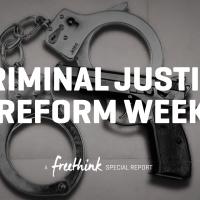A Freethink update:
It’s been several months since we first brought you the story of journalist Jamie Kalven and his influential “Sixteen Shots” expose in Slate that depicted a corrupt Chicago police department in the midst of a cover-up following the racist killing of teenager Laquan McDonald, who was shot 16 times by Officer Jason Van Dyke on October 20, 2014.
Since then, Kalven has written another critical piece, this time for the Chicago Tribune, in which he takes Chicago’s leadership and then-Mayor-elect Lori Lightfoot to task for the lack of police accountability and transparency that allowed the 2014 murder and subsequent concealment to take place.
Without an immediate move to “overhaul the city’s transparency policies with respect to police disciplinary records and other information bearing on public safety,” he argues, Chicago police will have no reason to clean up their act and may even be emboldened if bureaucracy and red tape strangles the process.
As he sees it, the problem with police accountability comes up in direct conflict with the control of information, which he calls an instrument of power. Who has and doesn’t have access to important information about local police officers defines the struggle between the Chicago police department and the residents they’re hired to protect.
To him, the absence of information and disinformation is just another form of lying, but he’s quick to walk back what he calls the “cover-up narrative.”
“If it was a cover-up, in the narrow sense of the word, then it would be sufficient to remove from office those who conspired to hide their misdeeds from the public,” he argues. “But the problem goes far deeper than that.”
He’s right. Removing a few bad seeds won’t cure Chicago’s troubled police department, and it won’t explain how certain individuals felt they could, and almost did, get away with it.
He challenges the narrative given—and the story it tells—by pointing to a lack of compliance with Freedom of Information Act requests by Chicago leadership on the shaky grounds of “undue burden,” which is just a fancy way of saying they have so many complaints and requests that they can’t possibly keep up.
This illustrates just how hard it is to hold police accountable.
(Go deeper: Civilian Oversight Effectiveness & Understanding how to hold police accountable)
Even with a law on the books that requires information concerning police misconduct to be made available to the public, stalling, obscuring information, and outright lies and mischief are still commonplace. Better yet, sources have told Kalven that the Chicago police department and former Mayor Rahm Emanuel’s office were using Freedom of Information Act requests as warning signs for critical reporting and stories that were in the works, seemingly so that the real cover-up could begin.
Kalven’s suggestion is that all police misconduct files should be made public with redacted personal information so that independent watchdogs like his Invisible Institute, which focuses on police accountability, can meticulously comb the files and sound the alarm if they notice something questionable.
The tides do seem to be changing, though.
On July 24, 2019, the Chicago City Council approved the new Mayor’s ethics reform package, which intends to clean up the rampant corruption and shady practices that have plagued Chicago for decades by increasing transparency and the role of city watchdogs.
This came just weeks after four Chicago police officers were fired for their part in covering up the 2014 “Sixteen Shots” murder, where they were found to have exaggerated the alleged threat posed to their fellow officer.
Whether or not we’ll see real change at Chicago police departments remains to be seen. There’s some hope on the horizon, but no number of articles or policy-making will bring back Laquan McDonald, even if it does serve to advance the cause of police accountability.
(Related Article: Michael Bell Fights to Strengthen Reforms to Reduce Police Shootings)
—
Any list of the most influential reporters on criminal justice reform in recent years would have to include Jamie Kalven.
As Julie Bosman of The New York Times put it plainly, “If not for the reporting of Jamie Kalven, an independent journalist in Chicago, the world might never have known the name Laquan McDonald, a black teenager who was shot 16 times by a police officer as he walked down a street holding a folding knife.”
His reporting—including the now infamous exposé in Slate titled “Sixteen Shots” which detailed the results of McDonald’s autopsy and showed how it contradicted the Chicago Police Department’s official report—kicked of a series of events that led to the arrest and eventual conviction of Officer Jason Van Dyke for McDonald’s murder.
Kalven, in addition to being an independent journalist, is the founder of the Invisible Institute, a “journalism production company on the South Side of Chicago” that serves as an umbrella for a number of journalistic projects. One of those projects is the Citizens Police Data Project, the result of a nearly decade-long lawsuit against the city by Kalven’s Invisible Institute, Craig Futterman of the University of Chicago Law School, and others to turn over police disciplinary data.
“We’d achieved this extraordinary level of transparency (with the lawsuit). These documents are public. They belong to the public, but the principle isn’t self-executing. It awaits on civil society to make it meaningful,” Kalven reflects, “And so the question for us became, how do we go about operationalizing that principle, making this information legible, useful to citizens in general, and to particular constituencies? The outgrowth of that is something called the Citizen’s Police Data Project, which is now a public-facing database that houses, in civil society, these documents, and allows all sorts of lines of inquiry and analysis.”
Through the Citizens Police Data Project, anyone can explore nearly 30 years of data from the police department to see trends and patterns. “I think the Laquan McDonald case is really probably the single most dramatic illustration, at least at the moment, of why it’s so important that public info be public,” Kalven says. The CPDP database showed that Van Dyke, the officer eventually convicted for McDonald’s murder, “had 20-odd complaints against him, citizen complaints, none of them ever sustained, 10 of which were for excessive force,” Kalven explains.
Kalven is quick to clarify that this data shouldn’t be used to definitively decide whether an officer is good or bad. “I would not for a moment claim that the disciplinary profile predicted what happened,” Kalven clarifies. “But that pattern that emerged from those 20 complaints surely warranted a supervisor and investigator looking to see what was going on with this officer.”
The point of projects like this is, Kalven argues, is to aid the public in understanding and holding accountable the institutions that are designed to serve the public.
“One former police executive I know in New York once said that ‘in a democracy, there is nothing as good as a good police officer and there is nothing as bad as a bad police officer’. And that is really the perspective we take,” Kalven says.
“The police play an absolutely critical role in a democracy and we vest them with extraordinary powers. The power to stop and detain people, the power to use force, the power under certain circumstances to use deadly force. These are extraordinary powers and in a democracy with power comes responsibility, with power, comes accountability.”
He adds, “The moral standard we all need to embrace is to know what can be known, and to act on that knowledge.”


